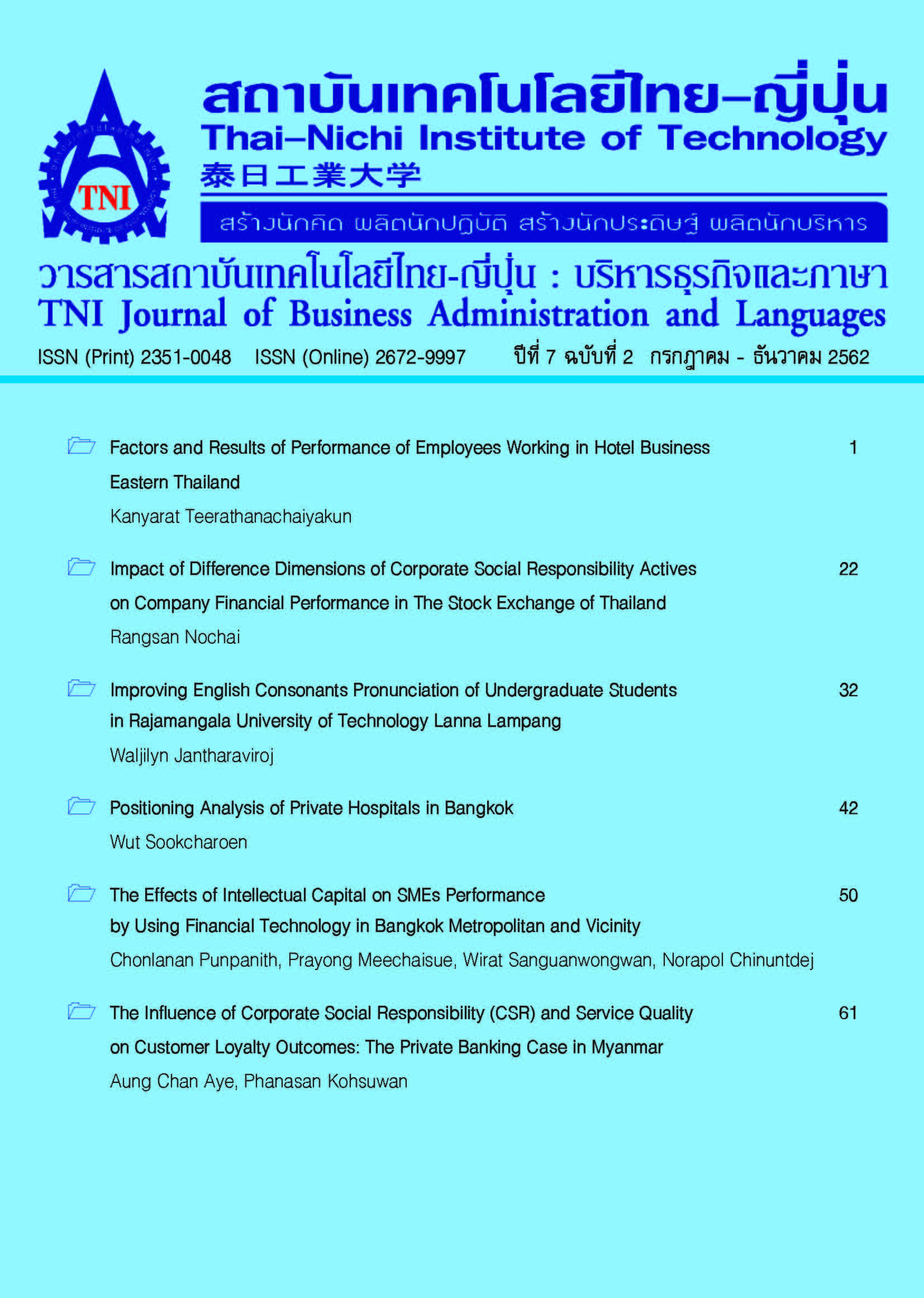Improving English Consonants Pronunciation of Undergraduate Students in Rajamangala University of Technology Lanna Lampang
Main Article Content
Abstract
The purposes of the research were to: 1) study the phonetics features of English consonants as pronounced by undergraduate students in Rajamangala University of Technology Lanna Lampang, 2) improve English consonants pronunciation skill, and 3) compare the students’ learning achievement by contrasting the participants’ pre-test and post-test score. The target group was twenty-four accounting students. Data were analyzed by percentage, average, and t-test. The research instruments were English pronunciation test, sets of pronunciation activities, and places and manners of articulation diagram. The results of the study were the followings:
1. The phonetic features of English consonants pronunciation problem with the percentages of 100.00 were the fricatives ([v], [θ], [ð], [z], [ʃ], [ʒ]), affricates ([tʃ], and [dʒ]), stop (plosive) ([g]), lateral ([l]), and approximant ([r]). The consonants with less pronunciation problem were [f)], [s], and [t] with the percentage of 80, 50, and 25 respectively.
2. After the improving process of using sets of pronunciation activities and places and manners of articulations diagrams, the participants could pronounce English consonants correctly with the average percentage of 77.56, increased by 34.13 per cent.
3. By comparing the participants’ learning achievement, it was found that there was a significant difference between pre-test and post-test score with a mean significant gain score of +14.59. Participants were found to be able to pronounce English consonants correctly after participating in the activity (t (46) = 2.013, p<.05).
Article Details
Article Accepting Policy
The editorial board of Thai-Nichi Institute of Technology is pleased to receive articles from lecturers and experts in the fields of business administration, languages, engineering and technology written in Thai or English. The academic work submitted for publication must not be published in any other publication before and must not be under consideration of other journal submissions. Therefore, those interested in participating in the dissemination of work and knowledge can submit their article to the editorial board for further submission to the screening committee to consider publishing in the journal. The articles that can be published include solely research articles. Interested persons can prepare their articles by reviewing recommendations for article authors.
Copyright infringement is solely the responsibility of the author(s) of the article. Articles that have been published must be screened and reviewed for quality from qualified experts approved by the editorial board.
The text that appears within each article published in this research journal is a personal opinion of each author, nothing related to Thai-Nichi Institute of Technology, and other faculty members in the institution in any way. Responsibilities and accuracy for the content of each article are owned by each author. If there is any mistake, each author will be responsible for his/her own article(s).
The editorial board reserves the right not to bring any content, views or comments of articles in the Journal of Thai-Nichi Institute of Technology to publish before receiving permission from the authorized author(s) in writing. The published work is the copyright of the Journal of Thai-Nichi Institute of Technology.
References
Dee-in, W. (2006). The Development of computer-assisted Instruction Lessons Promoting oral Skills for English problem Sound for Students of English majoring in International Communication, Rajamangala University of Technology Lanna Phitsanulok campus (Master’s thesis). Uttaradit Rajabhat University, Uttaradit.
Gilakjani P., A. (2016). The Significance of Pronunciation in English Language Teaching. International Journal of Research in English Education, 1(1), 1-6.
Hewings, M. (2004). Pronunciation Practice Activities. Cambridge: Cambridge University press.
Monthon Kanokpermpoon. (2007). Thai and English Consonantal Sounds A Problem or A Potential for EFL Learning?. ABAC Journal, 27(1), 57-66.
Phubet Khaichaiyaphum. (2007). The Development of English Final Consonant Pronunciation of Prathomsuksa 5 Thamafaiwan School, Kangkhor district, Chaiyapoom province (Master’s thesis). Loey Rajabhat University, Loey.
Roach, P. (2009). English Phonetics and Phonology: A practical course. Cambridge: Cambridge University Press.
Sattra Sahatsathatsana. (2017). Pronunciation Problems of Thai Students Learning English Phonetic: A case study at Kalasin University. Journal of Education, Mahasarakham University, 11(4), 67- 84.
Sukarna Chakma. (2014). Difficulty in Pronunciation of Certain English Consonant sounds. Sripratum Chonburi Journal, 10(3), 110-118.
Teeraporn Plailek. (2016). The development of pronunciation skill in English Final consonant sounds of prathomsuksa 6 Students at Demonstration School, Suan Sunandha Rajabhat University. In (Ed), Proceedings of 81“The IIER International Conferenc,148-151. Retrieved from https://www.eledu.ssru.ac.th/teeraporn_pl/pluginfile.php/74/block_html/content/Russia-Proceedings.PDF
The Center for the Enhancement of Teaching. (n.d.). How to improve test reliability and validity: Implications for grading. Retrieved from https://oct.stsu.edu/assessment/evaluating/htmls/improve_rel_val.htm.
Thirawat Tanthanis. (2013). English Pronunciation problem of Third year interdisciplinary Studies Syudents of Thammasat University. Retrieved from https://kukr.lib.ku.ac.th/db/BKN/search_detail/dowload_digital_file/13417/16514
Wichura Winaitham and Suksan Suppasetseree. (2012). The Investigation of English Pronunciation Errors and Factors Affecting English Pronunciation of Thai undergraduate Students. Silpakorn Educational Research Journal, 4(2), 304-320.
Youfu, W. and Yalun, Z. (2002). The Insights into English Pronunciation Problems of Thai Students. Retrieved from files.eric.ed.gov/fulltext/ED476746.pdf


